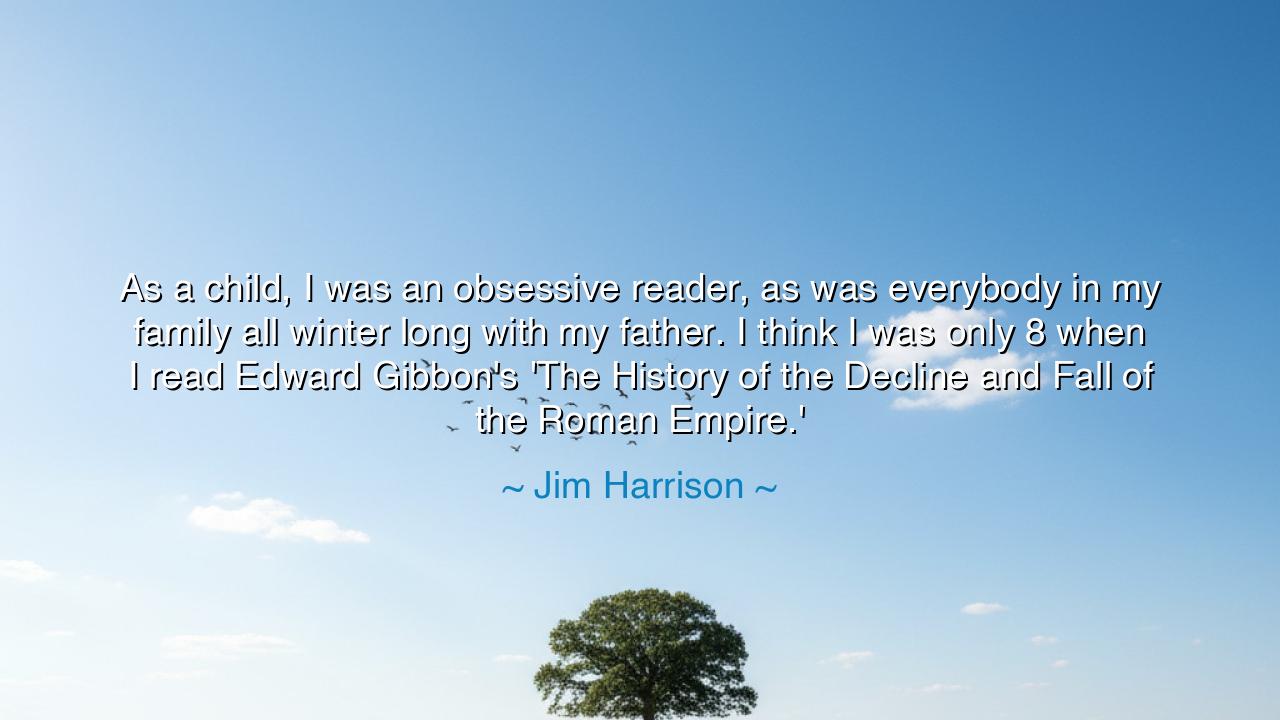
As a child, I was an obsessive reader, as was everybody in my
As a child, I was an obsessive reader, as was everybody in my family all winter long with my father. I think I was only 8 when I read Edward Gibbon's 'The History of the Decline and Fall of the Roman Empire.'






In the words of Jim Harrison, the poet of wilderness and appetite, there glimmers the image of a childhood steeped in both solitude and wonder: “As a child, I was an obsessive reader, as was everybody in my family all winter long with my father. I think I was only 8 when I read Edward Gibbon’s The History of the Decline and Fall of the Roman Empire.” This simple remembrance, though quiet in tone, reveals the making of a mind forged in discipline, imagination, and the sacred act of reading. It speaks of an ancient ritual — of a family gathered in the deep snows of winter, their lamps burning, their souls illuminated by the words of the dead. In this memory, reading is not leisure; it is lineage.
The origin of this truth lies in the life of Harrison himself — a man who roamed the borderlands between civilization and wilderness, between hunger and reflection. Born in the cold reaches of Michigan, he learned early that the long winters were not to be endured idly. In his family, the written word was not an escape from the world but a means of entering it more deeply. While the wind howled outside and the days grew short, the family gathered to feed their minds as others might feed their fires. In those hours, young Harrison discovered what few children ever touch so soon — the infinite expanse of thought that books can open.
To read Gibbon’s The Decline and Fall of the Roman Empire at the age of eight is an act almost mythic in itself. For Gibbon’s work is not a child’s tale but a monument of history — a vast and grave meditation on the rise and decay of power, ambition, and civilization. Imagine, then, a boy so young, tracing with small fingers the story of emperors and legions, of grandeur turned to dust. What seed must such a book have planted in his soul? In that encounter, the child learned not only the fall of Rome but the impermanence of all things. The pages whispered to him what every philosopher must one day learn: that even the mightiest empires crumble, but the written word endures.
This memory, spoken later in life, reveals how the soul of the artist is shaped not by chance, but by the habits of thought sown in youth. The obsessive reader becomes the wise writer, just as the attentive listener becomes the poet. Harrison’s later work — wild, earthy, and profound — bears the echo of those long winters spent in communion with books. He wrote of rivers, of love, of the natural world, yet beneath it all there pulsed the rhythm of history, the awareness that all human striving belongs to a greater cycle of rise and fall. The lessons of Rome lived in him as the memory of snow and fire — quiet, enduring, humbling.
Consider, too, the example of another — the young Abraham Lincoln, who by candlelight read the King James Bible, Aesop’s Fables, and The Life of Washington in a log cabin deep in the American frontier. Like Harrison, Lincoln’s early reading was not entertainment but formation. Both men, separated by a century, were shaped by books read in isolation, their minds kindled while the world slept. This is the ancient truth Harrison’s words recall: that greatness often begins in silence, in the still companionship of books and ideas.
Harrison’s quote is not nostalgia but revelation. He reminds us that to read deeply is to enter into a dialogue with time itself. The child who reads Gibbon is not merely consuming information; he is walking with the historian through the ruins of empires, learning the rhythm of destiny. The act of reading becomes an act of inheritance — of receiving the wisdom of centuries and carrying it forward into one’s own life. In the cold of winter, Harrison was warmed by the fire of human thought, a fire kindled by generations before him.
Therefore, O seeker of meaning, learn from Jim Harrison’s example. Do not treat books as ornaments, nor reading as obligation. Read as he did — obsessively, passionately, as if the words were food and the mind a body that must be fed. Choose works that challenge you, that stretch your spirit beyond comfort. Seek, as Harrison sought, the company of the great minds who came before, and let them speak through the centuries to you.
For in this practice lies both humility and power. The boy who read Gibbon grew into a man who understood not only literature but life itself — its impermanence, its beauty, its tragic cycles. So too may you find in reading a mirror of your own existence. And when the winters of your life come — when the world grows cold and still — remember that the lamp of the mind, once lit, can never be extinguished. That is the legacy of the obsessive reader, and the eternal gift of the written word.






AAdministratorAdministrator
Welcome, honored guests. Please leave a comment, we will respond soon